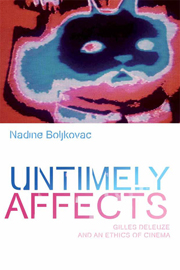6 - Of Scars, Smiles and Past-Future Signs
Published online by Cambridge University Press: 05 September 2013
Summary
‘Memory is not in us; it is we who move in a Being-memory, a world-memory.’
(C2: 98)By way of brief returns to Hiroshima mon amour and Sans Soleil, through Marker's Le Souvenir d'un Avenir (2001) and an extended analysis of his Chats Perchés (2004), this final chapter replays and newly explores thoughts pertaining to counter-actualisation and dramatisation, signs, faciality, repetition, temporal synthesis, depth and surface, as well as the encounter of film and philosophy itself. While discussions of these concepts, themes and singular expressions have resurfaced throughout these pages, this chapter emerges and develops most notably from the last upon Sans Soleil. Which is to say, as it examines Marker's more recent works against Resnais' canonical Hiroshima mon amour, a film that indeed, as Chapter 3 evinces, defies rigid terms of classification or interpretation, this chapter moves towards a broader examination of virtual potentials and means of resistance through considerations of past-present-future uprisings, hypocrisies, wars and their lasting resonances. The process of thinking Marker and Resnais' works together, particularly in this chapter, discovers ever-unique forms of resistance to orders and forms of repression that distinguish modern existence. As attuned then to this book's concern with the paradoxically irrevocable and fleeting, haunting yet transient, this chapter turns once more through repeating concepts to repeating connections between and through Marker and Resnais' bodies of works.
- Type
- Chapter
- Information
- Untimely AffectsGilles Deleuze and an Ethics of Cinema, pp. 145 - 171Publisher: Edinburgh University PressPrint publication year: 2013



